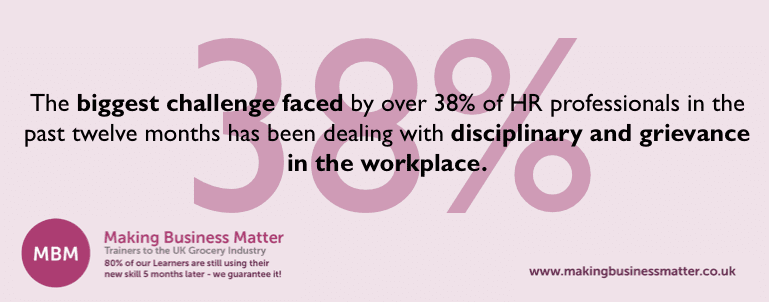Grievances at Work
Your staff should handle all grievances at work carefully and quickly. By listening to your employees, you will have a chance to develop a good relationship with them. A good employee relations program encourages mutual respect between the employee and the manager. It is a connection with open and honest communication. A good relationship forms when there is fair treatment and mutual trust for all.
What is an Employee Grievance?
Grievances are concerns, problems, or complaints raised by a staff member with management. A grievance at work can be any problem an employee has. It can be anything from unsafe working conditions to sexual harassment.
When an employee raises a concern, it is important to act quickly to resolve that matter. Some grievances at work can uncover illegal activities as well. When you take their concerns seriously, they will begin to trust you and the company. At first, employees may make jokes or say little comments about an issue. It is important to listen to the small talk. If not, these little issues can become bigger later.
Improving Engagement
Sometimes you may not find the complaint valid. Regardless, you should treat every grievance as an opportunity to help your employees. There is a reason they feel the way they do. You improve employee engagement when you listen to all complaints and grievances. Employees feel connected when they have some control over their workplace situation.
Your company should have a system for handling grievances at work. This improves employee engagement within the business.
Employee engagement is still a top concern for employers. In a 2018 survey of 447 Human Resource (HR) directors:
- 44% said their biggest hurdle for the coming year would be employee engagement.
- 36% is staff retention.
- 33% is absence management and recruitment.
- 26% is succession and planning.
It is important to urge your employees to let you know of any issues they are having.

Examples of Workplace Grievances
There are many types of grievance at work. Some may be easy to handle, and others may take a full investigation.
Management Grievances at Work
Some issues employees may have with their boss is:
- Not listening to their problems.
- Showing favouritism toward other employees.
- Micromanaging.
- Bullying.
You may hear of an issue from several sources. If so, there is a strong possibility there is a problem. Make sure you have a good Leadership Training program. Teach your managers how to be leaders. Some conflict may simply be a communication problem. Sometimes managers become so busy, they forget to speak clearly with their employees.

Co-Worker Grievances at Work
Some issues employees may have with their co-workers are:
- Bullying them.
- Harassing them.
Bullying is not against the law, but you should investigate these occurrences.
Workplace Harassment is against the law when it is unwanted behaviour related to:
- Age
- Sex
- Disability
- Gender reassignment
- Marriage and civil partnership
- Pregnancy and maternity
- Race
- Religion or belief
- Sexual orientation
Everyone should know and understand your bullying and harassment policies. You should have a zero-tolerance procedure in place.
Job Duty Grievances at Work
Employees may complain that:
- Their job duties don’t match their job description.
- Their performance review wasn’t correct.
- They have a heavy workload.
Employees may be doing a different job than what they were hired to do. You may need to conduct a job analysis if they aren’t doing what their job description says they should do. Consider updating your job description and induction processes if this is the case. You may even find you need to create a new position.
If they are complaining about their workload, you should also do a job analysis for that as well. You could also investigate the workload of others that do the same job.
Work Environment Grievances at Work
Employees may complain that:
- The work area is unsafe or messy.
- The work area temperature is too hot or too cold.
- The bathrooms are not clean.
- The parking lot is always full or unsafe.
Employees don’t like working in messy environments or unsafe conditions. If an employee is complaining about their work area, you should inspect the area. Ensure there are no safety violations, and that the organisation is meeting relevant Health and Safety requirements. You may wish to form a safety committee. They can do weekly checks to make sure the business stays safe and clean.

Office Policy Grievances at Work
Employees may complain about:
- Outdated policies.
- Policies not enforced by some departments.
You may find policies which aren’t needed any longer. You may also find that one manager isn’t enforcing policy, but another one is. This can cause problems between work areas. Ensure you review your employee handbook and policies annually.
Develop all HR policies, procedures, and work rules in conjunction with line management. The role of HR in this process is to advise managers on best practices and legal requirements. They should work with them to develop policies which are clear and consistent. They should align with business goals. The policies should be easily communicated to everyone. They should be fair and easy to understand.
Work Hours or Schedule Grievances at Work
Some issues employees may have are:
- Too many or not enough working hours.
- Working weekends.
- Childcare issues.
Employees may be having personal issues which are causing problems for them. For example, they may have childcare issues in the morning and need to come to work later. Could you offer a more flexible schedule? By reviewing schedules and work times, you may find you need more workers than you thought. You may even find you need fewer workers.
Pay and Benefits Grievances at Work
Employees may complain if:
- They aren’t paid correctly for a job they are doing.
- Overtime isn’t paid.
- They feel they aren’t being paid fairly or equally.
- Benefits they were told they would get are not received.
This is a great time to review your compensation plan. You should make sure it is consistent within the business. Make sure you have a good pay and benefits policy which discusses how often raises occur. Thoroughly investigate these issues. You may have to give back pay if someone wasn’t paid correctly.
Discrimination Grievances at Work
There are many different instances of discrimination. Maybe a woman doesn’t feel she is being paid equally to a man. Someone with a disability may feel they are treated differently.
It is against the law to discriminate against a person. It could be because of age, disability, gender reassignment, marriage and civil partnership, race, religion or belief, sex, or sexual orientation.
The law protects the employee from discrimination at work concerning:
- Dismissal
- Employment terms and conditions
- Pay and benefits
- Promotion and transfer opportunities
- Training
- Recruitment
- Redundancy
You should ensure you have a zero-tolerance for discrimination. Workplace diversity should be harnessed and embraced. Correct the situation immediately.
How Employees May File a Grievance
You should have a written grievance procedure in your employee handbook. It should explain how they file their grievance at work. Outline your process so employees know what to do.
1. Issue the Complaint to the Supervisor
You can ask them to file a complaint first with their line supervisor. It should have a time limit within so many working days (e.g., three working days) of the incident. The complaint can be informal at first with the supervisor. The complaint may be simple and can be a quick fix like a messy work area. If it is informal and handled correctly, the supervisor can close the issue.
2. Issue a Formal Complaint
If the employee doesn’t feel the issue was resolved, they may issue a formal complaint. They should prepare and send a formal written letter. The HR department should receive a complaint. Then, either the manager or the HR department should fully investigate.
3. Complete an Investigation
The manager investigating the issue should interview the person issuing the complaint. They should ask questions such as:
- Who are the employees involved?
- What is the exact grievance?
- Where did the incident occur?
- How did the incident occur?
- When did the incident occur?
You should ask the right questions. Ask them to describe as much detail as possible and ensure you write down everything. The summary of the incident should describe in detail what occurred from their point of view.
If the person is complaining about another person, then you should talk to the other party as well. Make sure you get a signed, written statement from all parties about the alleged incident. You should also look at any evidence and gather witness statements as well. Review any surveillance video if it will help you in the investigation. Most importantly, ensure all parties involved understands the procedure. They should know how the process will work.
4. Communicate the Outcome
You should inform all parties in writing about your decision. You should also include your appeal procedure in the event they would like it reviewed again. Ensure you have another manager to investigate if they should appeal. The person investigating the appeal should be the department manager or HR Manager. It should be someone who was not involved with the original inquiry.
Other Important Information
- You should ensure you follow the procedure exactly as your grievance policy states. What may seem small may become a larger issue during the investigation. If the grievance goes to a tribunal or court, you want to ensure you were thorough.
- Initially, the employer and the supervisor should try to resolve any grievance informally.
- Employers should arrange a meeting as quickly as possible once a grievance is filed.
- Treat all workers fairly and ensure your policies are fair.
- You should rely on facts to make your determination. Be thorough with your questions so you will get all the essential information.
- Ensure you speak openly with everyone involved. You should put everything in writing.
- Employees can be accompanied at any formal meeting by a colleague. They also have the right to appeal against any formal decision made.
- All information should be confidential. Tell all parties involved to not discuss the investigation with others.
- The investigator should not be involved with the issue being investigated.
- The employee has a right to see all information in their file, which could include notes about them. The employer’s process should be transparent and open.
- It is vital to train your leaders about how to deal with grievances. They should not dismiss staff concerns.
- Keep accurate records. You should have everything written down. All documents should be signed.
- Develop a list of questions before you meet with the employee.
- Find out what they want as an outcome. Sometimes finding out what they want gives you even more information.
- Train your leaders in employment law and employee rights. Let them know they cannot get fired for filing a grievance. They should never fear for their job when they issue a complaint.
- Ensure all employment activities are compliant with all laws and regulations.
Final Thoughts
If the grievance at work is substantial and it concerns another staff member, take immediate action. It is vital to give proper disciplinary action once everything is complete. It should be fair and consistent with your policies. Make sure that you treat all employees the same.
Try to resolve all grievances within the company. An employee can file a complaint with ACAS. They can do this if they feel their grievance wasn’t handled properly. They will offer them the opportunity to use early conciliation. This is a free process which involves ACAS working with you and the employee. They will try to find a solution acceptable to both of you. The aim is to avoid the need to take a claim to the Employment Tribunal.
Typically, managers are not trained properly about how to handle a grievance or complaint. They may become defensive or dismiss the employee. Ensure proper training for your managers so that they handle the complaints wisely.
Ensure your company has an open-door policy. If you do have this policy, make sure all staff members use it when needed. They should know how to listen and speak with their staff. Managers shouldn’t fear negative feedback from their workers. Proper communication builds trust and respect.
Assessing the organisational climate is important. Your company can do this through surveys, committees, and regular effective meetings. Usually, a staff member gives information in these formats before filing a complaint. It is important to listen to this feedback. If you don’t, a simple complaint can become a large-scale morale problem.




